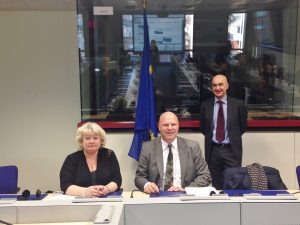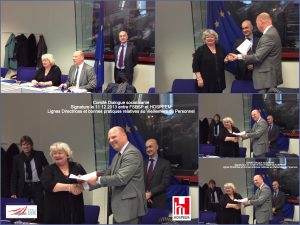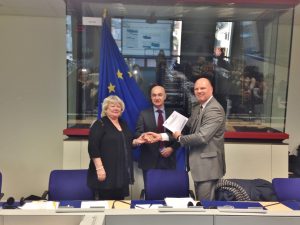Brussels, 26 June 2013/18 September 2013
Joint EPSU-HOSPEEM Project “Promotion and support of the implementation of Directive 2010/32/EU on the prevention of sharps injuries in the hospital and health care sector”
Final Conference – Barcelona, 20 June 2013
The final conference with about 95 participants from 24 out of 28 EU Member States (including Croatia to adhere to the EU as of 1 July 2013) took place on 20 June 2013 in Barcelona. It was hosted by EPSU affiliate Federación de Servicios Públicos Unión General de Trabajadores (FSP UGT) and organised by EPSU and HOSPEEM.
Please read the Joint HOSPEEM-EPSU Press Release.
 Joint Press Release
Joint Press Release
DRAFT programme (as of 24 May 2013) – in EN only
 Final Conference Barcelona DRAFT Programme (as of 24 May 2013)
Final Conference Barcelona DRAFT Programme (as of 24 May 2013)
N.B. : Event with simultaneous interpretation from and into the following five languages : English, French, German, Italian and Spanish
Please have a look into the final project report (comprising information on the three regional seminars, the final conference and the various EU countries covered, drafted by ICF GHK (Dr. Tina Weber)
 Final Report Project + Final Conference – EN
Final Report Project + Final Conference – EN
 Final Report Project + Final Conference – FR
Final Report Project + Final Conference – FR
 Final Report Project + Final Conference – ES
Final Report Project + Final Conference – ES
 Final Report Project + Final Conference – PL
Final Report Project + Final Conference – PL
 Final Report Project + Final Conference – DE
Final Report Project + Final Conference – DE
Please have a look at photos taken at the event.
Presentations
We have uploaded below the slide sets used by the speakers for their presentations (in the original language and when this was not in English also translated into EN).
Implementation of Directive 2010/32/EU on prevention of sharps injuries in the hospital and health care sector :
Presentation to Project Closing Conference 20th June 2013, Barcelona (Dr. Tina Weber, ICF GHK)
 Presentation Weber
Presentation Weber
Austria
Nadelstichverordnung : Umsetzung und praktische Erfahrungen / Needlestick directive : Implementation and practical experience
Renate Waclawiczek, Head of the Department for Occupational Medicine, Salzburg Regional Hospitals (SALK), Salzburg
 Presentation Austria (Renate Waclawiczek) – DE
Presentation Austria (Renate Waclawiczek) – DE
 Presentation Austria (Renate Waclawiczek) – EN
Presentation Austria (Renate Waclawiczek) – EN
Bulgaria
Mise en application de la directive 2010/32/UE “Prévention des blessures par objets tranchants dans le secteur hospitalier et sanitaire” en Bulgarie / Implementation of Directive 2010/32/EU on the prevention of sharps injuries in the hospital and healthcare sector in Bulgaria
Slava Zlatanova, Vice-President, Federation of Trade Unions-Health Services – CITUB, Sofia
 Presentation Bulgaria (Slava Zlatanova) – EN
Presentation Bulgaria (Slava Zlatanova) – EN
 Presentation Bulgaria (Slava Zlatanova) – FR
Presentation Bulgaria (Slava Zlatanova) – FR
Germany
Richtlinie 2010/32/EU zur Vermeidung von Verletzungen mit spitzen und scharfen Gegenständen : Prozeß der Umsetzung in Deutschland / Directive 2010/32/EU on the prevention of sharps injuries in the hospital and health care sector : Process of transposition of directive in Germany & Die Rolle von ver.di bei der Implementierung der EU Richtlinie 2010/32/EU in Deutschland / The role of ver.di in implementing -EU Directive 2010/32/EU in Germany
Sabine Niemeyer, Federal Ministry of Labour and Social Affairs (BMAS), Bonn & Herbert Beck, ver.di, Head of Staff Council/Employee Committee of the University Clinic Heidelberg, Heidelberg
 Presentation Germany Part 1 (Sabine Niemeyer) – EN
Presentation Germany Part 1 (Sabine Niemeyer) – EN
 Presentation Germany Part 1 (Sabine Niemeyer) – DE
Presentation Germany Part 1 (Sabine Niemeyer) – DE
 Presentation Germany Part 2 (Herbert Beck) – EN
Presentation Germany Part 2 (Herbert Beck) – EN
 Presentation Germany Part 2 (Herbert Beck) – DE
Presentation Germany Part 2 (Herbert Beck) – DE
Ireland
Implementation of Good Practice in a Dublin Hospital
Dr. Blanaid Hayes, Consultant Occupational Physician, Beaumont Hospital, Dublin
 Presentation Ireland (Blanaid Hayes) – EN
Presentation Ireland (Blanaid Hayes) – EN
The Netherlands
Effect of Directive 2010/32/EC, its impact at workplace level. How does it decrease the number of NSI’s in Dutch hospitals ?
Dr. Gerard Frijstein, Occupational Physician, Academic Medical Centre University of Amsterdam, Amsterdam
 Presentation The Netherlands (Gerard Frijstein) – EN
Presentation The Netherlands (Gerard Frijstein) – EN
Norway
Presentation on situation in Norway
Bjørn Henriksen, Special Advisor, Employers’ Association SPEKTER
 Presentation Norway (Björn Henriksen) – EN
Presentation Norway (Björn Henriksen) – EN
Spain
The use of guidance developed by FSP UGT when informing and training health workers and their representatives
Pilar Navarro Barrios, Head of Sector “Public Health Care”, FSP UGT
N.B. : No slide set available, oral presentation delivered by Pilar Navarro Barrios, FSP UGT. You can have a look to the user manual elaborated on page “Guidance (Guidelines, Handbooks, Tool Kits, Films)”
Sweden
A strategy and a toolkit to reduce sharp injuries in health care and medical services
Prof. Dr. Ann-Beth Antonsson (with contributions from Lisa Schmidt and Gabriella Östlund), Swedish Environmental Research Institute, Stockholm
 Presentation Sweden (Ann-Beth Antonsson) – EN
Presentation Sweden (Ann-Beth Antonsson) – EN
United Kingdom
Good Practice : guidance, handbooks and toolkits. The UK Partnership Guidelines – from theory to practice
Kim Sunley, Royal College of Nursing (RCN), London, & Dr. Ann Stansfield, Peterborough City Hospital / NHS Foundation Trust, Peterborough
 Presentation United Kingdom (Kim Sunley & Ann Stansfield) – EN
Presentation United Kingdom (Kim Sunley & Ann Stansfield) – EN
Prevention of injuries with medical sharps :
Experiences and expectations from the perspective of nurses and doctors. The role of occupational safety and health (OSH) strategies, policies and measures
Dr. Paulo Cristiano do Nascimento Simões, General Surgery Consultant Hospital Santa Cruz-CHLO, Lisbon / Sindicato Independente dos Medicos (SIM), Portuguese member of European Federation Of Salaried Doctors (FEMS))
 Presentation do Nascimento Simões (FEMS)
Presentation do Nascimento Simões (FEMS)
The file below contains a short presentation of HOSPEEM and EPSU as well as a summary of the activities and outcomes of the sectoral social dialogue committee in the hospital/health care sector in 2012.
 Presentation HOSPEEM & EPSU + Activities & Outcomes 2012 SSDC HS
Presentation HOSPEEM & EPSU + Activities & Outcomes 2012 SSDC HS
 This project has received funding from the European Commission
This project has received funding from the European Commission





Recent Comments